Great Laxey Mine Railway
The Great Laxey Mine Railway was originally constructed to serve the Isle of Man's Great Laxey Mine, a lead mine located in Laxey. The 19 in (483 mm) gauge railway runs from the old mine entrance to the washing floors along a right of way that passes through the Isle of Man's only remaining railway tunnel (another at Dhoon West Quarry is disused) under the 3 ft (914 mm) gauge Victorian Manx Electric Railway and the main A2 Douglas to Ramsey coast road.[1]
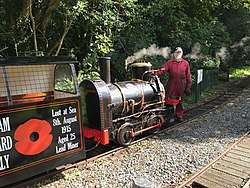 A passenger train about to depart from Mines Yard station. | |
| Overview | |
|---|---|
| Headquarters | Laxey |
| Locale | Isle of Man |
| Dates of operation | 1870s-1929, 2004–present |
| Technical | |
| Track gauge | 19 in (483 mm) |
| Length | 1⁄4 mi (0.4 km) |
History
The Great Laxey Mine was an extensive system of mine shafts and tunnels, which descended to a depth of 2,200 feet underground. The uppermost level of mine workings, known as the adit, was a series of tunnels extending to a mile and a half, which entered the hillside at ground level, and connected the heads of all the working mine shafts. Within this adit level a railway was provided from 1823, to allow transportation of mined ores from the mine shafts out to the external washing floors and mine yards.
The railway was originally hand-operated, with miners pushing small wagons. In 1827 a pit pony was purchased to haul the wagons, and the number of ponies grew as the mines expanded. By the 1870s there was a clear need for more modern motive power, and the two steam locomotives Ant and Bee were delivered in 1877.
The mine closed in 1929. The railway remained in place for the following six years, but in 1935 all parts of the railway above ground, including the locomotives and rolling stock, were scrapped.[2]
In the 1970s the adit level was reopened and explored for historical evidence. It was discovered that parts of the underground section of the railway were still intact, and in one tunnel an entire train (consisting of six open ore wagons) was found, abandoned underground when work in the mine had finished. The wagons were returned to ground level and restored.
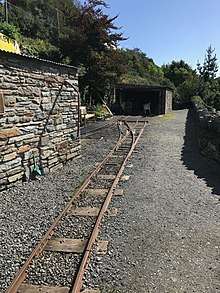
In the late 1990s momentum began to grow for the restoration of the railway's above-ground section, and in 2000 restoration work commenced. The restored railway was re-opened in 2004.
Restored route
The volunteers originally restored the railway's works and locomotive shed (rebuilding the shed on the exact footprint of the original). Clearance of blockages and damages in the tunnel enabled the original route to be relayed to a point close to the mine entrance in time for the 2004 re-opening. By 2005 the line had been relayed into the old mine yard. Although the line runs past the mine entrance, the spur into the underground section has not been restored.[3]
Trains on the restored line originally departed from the engine sheds, but in 2006 the original station site at the Valley Gardens was cleared, and the two-platform station was restored, with the track relayed on the original formation, including one of the tightest radius bends on a working heritage railway line in the British Isles. By 2006 a majority of the above-ground section of the original railway had been restored, including a running line extending to 1⁄4 mi (0.4 km) in length.
Stations
Passengers travel from Valley Gardens station to Mines Yard station, near the entrance to the mines. A regular shuttle service runs on operating days. Both stations have two platforms, permitting the operation of more than one train at busy times. There are no intermediate stations or loops. There is one spur, on the washing floors site, leading to the engine and carriage sheds.
Locomotives
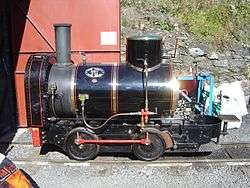
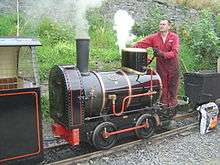
Following the periods of hand operation and then pony haulage, a pair of steam locomotives were delivered from Stephen Lewin of Poole in 1877. Ant and Bee were 0-4-0 tank locomotives made unusually narrow, in order to fit within the adit.[4] They were 4 ft 9in high and only 3 ft wide. Their two 4×6in inside cylinders had Bagnall-Price valve gear and a geared drive to the rear axle, but coupling rods between the axles. The arrangement of the water tanks was particularly unusual, being a front tank ahead of the smokebox, in order to reduce width. The boilers were launch-type, as were commonly used for small locomotives with insufficient space between the frames for a conventional firebox.[4]
Around 1905, a replacement locomotive was considered and W G Bagnall were asked for a design. This was similar to the Lewins design, but more conventional. A saddle tank was used and conventional cylinders with connecting rods to the axle. The power cylinders were however mounted inside the frames and the Bagnall-Price valvgear and slide valves mounted outside.[4] This new locomotive was never constructed, although Bagnalls did instead build two new boilers for the existing locomotives.[4] Both survived the closure of the mine, but were scrapped in 1935, six years afterwards.[4]
Replicas of both locomotives were constructed for the re-opening of the line as a tourist attraction. They now operate the line, together with a battery electric locomotive named Wasp, which previously worked in a mine in Cornwall.
Table of locomotives
| Name | Wheel arrangement | Builder's number | Year built & builder | Year rebuilt & builder | Notes |
|---|---|---|---|---|---|
| Ant | 0-4-0 | 684 | 1877 Stephen Lewin |
1905 W. G. Bagnall |
Scrapped in 1935. |
| Bee | 0-4-0 | 685 | 1877 Stephen Lewin |
1905 W. G. Bagnall |
Scrapped in 1935. |
| Ant | 0-4-0 | 20 | 2004 Great Northern Steam |
2007 Alan Keef |
Replica engine. Re-boilered 2011. In service. |
| Bee | 0-4-0 | 21 | 2004 Great Northern Steam |
2009 GLMR |
Replica engine. Re-boilered 2011. In service. |
| Wasp | 4WBL | B0152 | 1973 Clayton Equipment Company |
2009 Alan Keef |
Battery electric industrial tunnel engine moved to GLMR in 2009. In service. |
Rolling stock
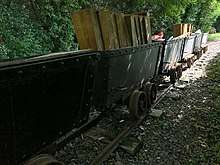
The railway operates two passenger carriages. Owing to the narrow gauge and low clearances the bogie carriages are long and narrow, with passengers sitting on longitudinal transverse benches, and effectively travelling sideways when the train is in motion.
- Carriage 1, built by Alan Keef Ltd in 2004.
- Carriage 2, built by Alan Keef Ltd in 2007.
The railway's freight wagons were originally constructed locally, and took the form of high-sided four-wheeled open ore wagons. A full train of these wagons was discovered underground in the mid-1970s.
- Six original ore wagons, now preserved in museum locations on the island.
- Six replica ore wagons, built at the Laxey Blacksmith in 2000, in regular service on the restored railway.
- 4-wheel tipping ore truck (not serviceable), static exhibit at Valley Gardens station.
Additionally, some rail vehicles are available for use by volunteer permanent way engineers on the railway, for construction and maintenance duties.
- 4-wheel tipping wagon, convertible to flatbed format, unofficially named Freddy (acquired second-hand in 2010).
- 4-wheel light maintenance trolley, unofficially named Jimmy, built in 2006.
- Single-wheel rail barrow - a single flanged wheel allows the barrow to be hand-operated along one rail of the running line. Liveried in engineering black and yellow wasp stripes.
Laxey Browside Tramway
At the upper terminus, linking the railway to the Laxey Wheel, once operated the Laxey Browside Tramway but this has long since vanished, replaced with a car park.
See also
| Wikimedia Commons has media related to Great Laxey Mine Railway. |
- British narrow gauge railways
- Laxey Wheel
References
Notes
- GLMR at British Heritage Railways
- GLMR historical data.
- Railway restoration webpage.
- Barnes, Robin (1985). "Chapter 3". Locomotives that never were. Jane's. pp. 12–13. ISBN 0-7106-0326-6.CS1 maint: ref=harv (link)
Bibliography
- Heavyside, Tom (2010). Douglas – Laxey – Ramsey: including the Groudle Glen Railway. Narrow Gauge Branch Lines series. Midhurst, West Sussex, UK: Middleton Press. ISBN 9781906008758.